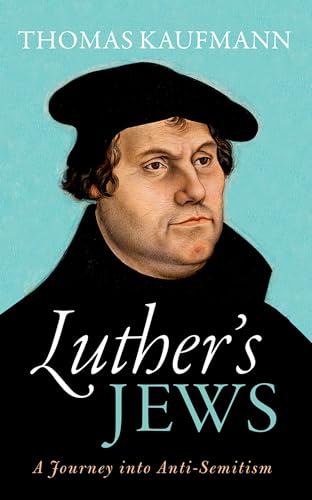Karl Barth: Ein Leben im Widerspruch
Written by Christiane Tietz Reviewed By Ron KubschChristiane Tietz, Professor of Systematic Theology at the University of Zürich, commemorates the fiftieth anniversary of Karl Barth’s death (December 10, 1968) with a pioneering study of his life and work. Karl Barth: Ein Leben im Widerspruch [Karl Barth: A Life of Conflict] is the first German-language biography of Barth since 1975 (written by his assistant Eberhard Busch). Tietz expertly builds her account on primary source materials as well as a wealth of scholarship on the renowned Swiss theologian and presents it in a readable account for the scholar and lay reader alike.
Tietz begins with Barth’s childhood and student years. She highlights his family life, early friendships, and studies in Bern, Berlin, Tübingen, and Marburg. From early on, Barth considered himself a follower of the staunch liberal theologian Adolf von Harnack. Hence while studying in Tübingen, he harbored “deep inner disdain” for Adolf Schlatter’s divergent approach to historical-critical exegesis (p. 50). Later in Marburg, Barth was especially drawn to the thought of Wilhelm Hermann, who had been deeply influenced by Friedrich Schleiermacher and Immanuel Kant.
During his pastoral apprenticeship in Geneva (1909−1911) and pastorate in Safenwil (1911−1921), Barth fell under the influence of Christian socialism. He learned from liberal Protestant theology that building the Kingdom of God was the key ethical imperative of Christianity, and he grew convinced that socialism was the channel to carry this mission out. He remained committed to socialist politics until his death.
It was also during his pastorate in Safenwil that his thinking radically changed course toward what became Barthian theology—variously designated as “theology of the Word of God,” “dialectical theology,” “Theology of crisis,” and “Neo-Orthodoxy.” Through his studies in Romans, he came to see that modern theology had confused the relationship between God and the world. Flipping the thought of Schleiermacher on its head, he contended that theology must begin with God and not man. He thus reoriented theology around the otherness of God, stressing the distance between God and man that could only be bridged by God’s self-revelation and the redemptive work of the God-man Jesus Christ. Beginning with the publication (and extensive subsequent revisions) of his commentary on Romans in 1918, Barth elaborated on the implications of this thinking in his writing and teaching for the rest of his life. His massive multivolume Church Dogmatics represents the culmination of his life work.
Given that this book is a biography and not a critical engagement with Barth’s theology, extensive analysis of his theology of the Word of God receives comparatively little room. Readers will, however, discover key aspects of Barth’s life about which many students of his theology know little.
At thirty-nine years of age and with five children, Barth began a bizarre love affair with Charlotte von Kirschbaum. Not wishing to conceal it, he not only told his wife but also moved Charlotte into their home. She lived with them for thirty-five years. Long a scandalous rumor, Barth’s children confirmed the veracity of the affair by releasing their love letters to the public in 1991. They spoke of the tremendous burden their father’s love triangle had on them and commended their mother for keeping the household together. As Tietz explains, Barth never sugarcoated the affair, nor did he attempt to justify it theologically. In his commentary on Romans 12, he downplays the need for a this-worldly ethic and stresses instead the importance of finding comfort for a guilty conscience in the grace of God.
Tietz also highlights Barth’s opposition to the ordination of women. While Barth was an avid participant in the growing ecumenical movement, he had no patience for its promotion of female ordination. He criticized the thinking behind it for committing the same errors as modern theology: its starting point was ultimately humanistic. He sympathized with women but insisted that theology must begin with God, and God’s Word taught against female ordination.
Barth’s encounter with the American evangelist Billy Graham is also treated in this book. Barth met Graham in Switzerland in August 1960, and he found him congenial. He did not like his preaching but felt Graham preached law rather than gospel, focusing too much on scaring people into conversion. For Barth, the “Christian faith began with joy, not fear” (p. 394).
Barth battled for many years not only with other theologians but also with depression. His final months were especially difficult. The day before he died, he told his childhood friend, “Yes, the world is a dark place. But do not hang your head! No! … God is in control. For this reason, I have no fear” (p. 414). Barth died in his sleep on December 10, 1968.
While Barth is among the most studied theologians in the English-speaking world and Asia, Schleiermacher has largely overshadowed Barth in contemporary German-speaking scholarship. Tietz sympathizes with Barthian theology, but she questions whether it will have much of a future as it offers very little to culture and science.
With his doctrine of the Word of God, Barth exposed obvious weaknesses of Neo-Protestantism. His wish to overcome Schleiermacher and consequently to make God the starting point for his thought moves in the right direction. But he never fully overcame the crisis of Protestant theology because he could not accept that Scripture was God’s very Word itself but rather a witness of divine revelation. He thus got stuck halfway. This writer believes that theology must ask more radically: what does God, in fact, say? Theology must take God at his Word, and this will not be possible without dramatic corrections to the course modern Protestantism has taken since Kant.
Tietz’s biography sheds tremendous insight into Barth’s life and thought. It combines diligent research, masterful narration, and accessible prose. Highly commended. (Editor’s note: this review was originally written in German and translated by Ryan Hoselton.)
Ron Kubsch
Ron Kubsch
Bucer Seminary
Munich, Germany
Other Articles in this Issue
In appreciation for the recent resurgence of interest in biblical theology and typological interpretation, this article considers Jonathan Edwards’s typological interpretive practices and principles...
The Insights and Shortcomings of Kantian Ethics: Signposts Signaling the Truthfulness of Christian Ethics
by Zachary BreitenbachImmanuel Kant proposed what he considered to be the one true ethical system—a system rooted in pure reason, without recourse to grounding morality in God, that sought to explain universal moral truth...
The Doctrine of Scripture and Biblical Contextualization: Inspiration, Authority, Inerrancy, and the Canon
by Jackson WuThis essay explores the relationship between contextualization and an evangelical doctrine of the Bible, with a special emphasis on biblical inspiration, biblical authority, biblical inerrancy, and the biblical canon...
Can We Hasten the Parousia? An Examination of Matt 24:14 and Its Implications for Missional Practice
by C. J. MooreAmong the many possible motivations for mission participation, the eschatological motivation for missions has recently grown in prevalence...
“Striving for Glory with God”: Humility as the Good Life in Basil of Caesarea’s Homily 20
by Coleman M. FordBasil of Caesarea (c. AD 330–379) presents humility as the essence of the good life in his Homily 20...






